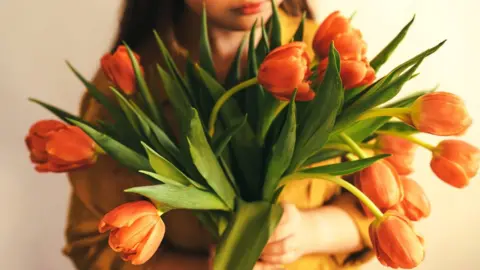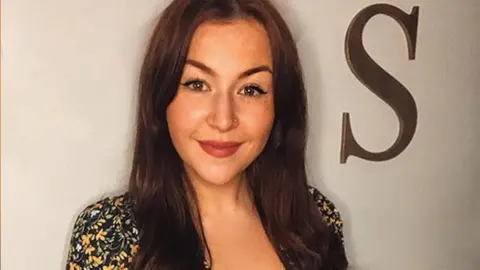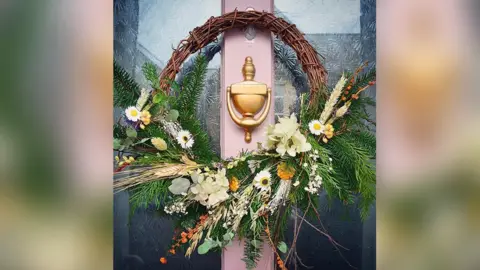Mother's Day: How sustainable are the flowers you buy?
 Getty Images
Getty ImagesAcross the UK thousands of people have been looking for that perfect bunch of flowers to celebrate Mother's Day this weekend.
But where did those flowers come from? And does it matter?
Florist Shannon Thomas works to highlight the "devastating impact" that buying cut flowers imported from abroad can have on the environment.
The 27-year-old, who was recognised at this year's Young Innovators Awards, is part of a growing movement of sustainable florists aiming to reduce the industry's carbon footprint.
How many flowers sold in the UK are from abroad?
In the UK alone, the market for cut flowers and ornamental plants was worth £1.3bn in 2018, according to government statistics.
About 90% of these flowers are imported, the vast majority of which come from the Netherlands, grown in heated greenhouses which release large amounts of CO2.
While more equatorial countries such as Kenya are now becoming bigger exporters, the transportation leads to issues of energy consumption and pollution, and has given rise to concerns over the additional use of pesticides.
"People don't really know that traditional flowers aren't sustainable and they are quite oblivious to the impact they have on the environment," said Shannon.
"They see fresh flowers available all year round and they're not really aware of the mass production involved in getting them to the stores."
 Jennie's Floral Design
Jennie's Floral Design What are sustainable flowers?
Steps have been taken over the years to cultivate a more ethical and sustainable flower trade.
Shannon, who runs Jennie's Floral Design in Pontypridd, Rhondda Cynon Taf, said consumers were becoming more concerned with how products were sourced.
"Sustainability is such a big issue for so many people. They are concerned about where their food comes from and people are more interested in veganism and the impact on the environment," she said.
"So once people are educated on the impact the floral industry has, I can't see why anyone would choose the traditional shop-bought flowers over sustainable flowers."
 Jennie's Floral Design
Jennie's Floral Design Materials such as single-use plastic and floral foam are commonplace in traditional designs and wreaths but cannot be composted or recycled.
So Shannon is working with British growers, which promotes sustainable sundries and operates recycling schemes for vases and wreath bases as well as encouraging customers to reuse items.
"These materials can have a negative impact on the environment," she said.
"It can't be composted or broken down, so all the funeral arrangements bases just end up at the landfill and release toxic gasses into the environment.
"Our designs are foam-free and made out of willow that are compostable. We only use recyclable material."
The Sustainable Floristry Network is working with florists to bring about serious change to an industry which is currently "fundamentally unsustainable".
Co-director Rita Feldmann said: "This not only relates to the way flowers are produced, but the range of unsustainable practices that are entrenched in industry and education, in particular the use of floral foam."
In a survey of 1,200 florists carried out by the network, 77% said access to training and education would make it easier to switch to foam-free techniques. Some 83% said floristry teaching methods needed to change to address industry best-practice.
 Shannon Thomas
Shannon Thomas Is it possible to sell only UK-grown flowers?
While many in the industry are pushing for a more sustainable approach, the practicalities can be challenging.
Shannon tries to use seasonal UK-grown flowers as much as possible and grows her own in an allotment.
However that can mean specific flowers are not available at certain times and she was forced to offer an alternative for customers ahead of Valentine's Day, rather than sell Kenyan roses.
Jacqui Bell, who owns The Little Flowermonger in Rhuddlan, Denbighshire, is passionate about using British-grown flowers but admits using domestic flowers was not always possible.
"It's no secret having to rely on seasonal products can, at times, be difficult," she said.
"This is not only due to availability. Using British stock means the growers are beholden to the elements, which in turn impacts me.
"If there have been unexpected changes with the weather and the product isn't available, it means I have to find alternatives and be creative, either through using my technical knowledge and experience to improvise, through trial and error or just speaking to the customer."
She said having many grower and supplier contracts around the country was a huge benefit but searching for a sought-after or alternative item could be time consuming.
"One difficulty is how quick some of the growing seasons are on specific products. The public does not always understand, as it might have been available the week before," she said.
"This differs to overseas traders who can stock the same items all year round, so sometimes you may see flowers in supermarkets that simply aren't available from British growers at that time."
